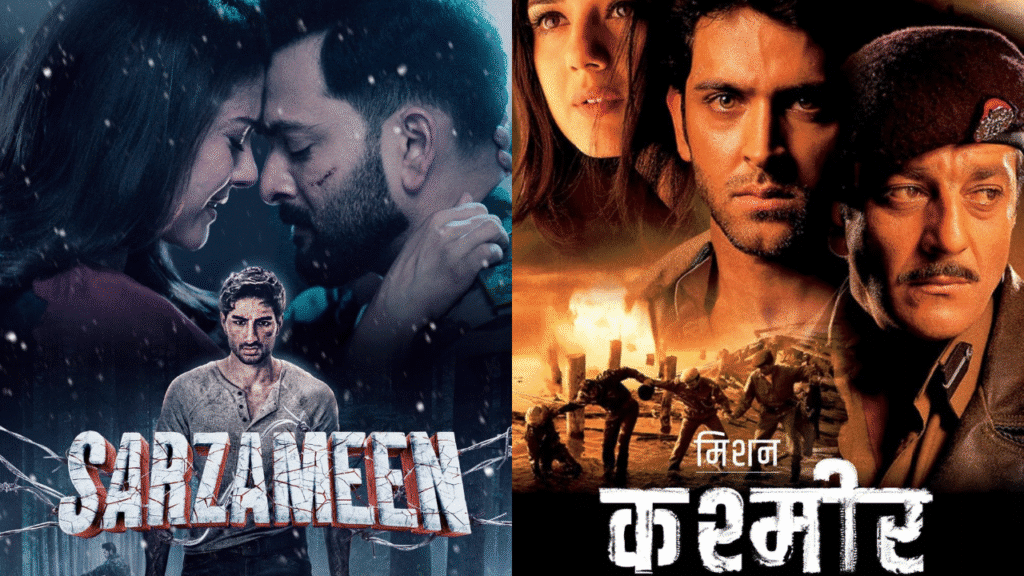The recently released Sarzameen, directed by Kayoze Irani and starring Prithviraj Sukumaran, Kajol, and Ibrahim Ali Khan, has sparked comparisons with the early 2000s cult classic Mission Kashmir (2000), directed by Vidhu Vinod Chopra and headlined by Sanjay Dutt and Hrithik Roshan. Both films explore themes of loss, identity, patriotism, and Kashmir’s socio-political complexities—but is Sarzameen really a remake of Mission Kashmir, or is it simply treading similar emotional territory?
Let’s explore the parallels and key differences between these two intense emotional thrillers.
Must Read: Sarzameen Movie Review: A Stirring Emotional Thriller with Standout Performances
The Common Ground: Kashmir, Conflict & Emotional Trauma
At first glance, Sarzameen and Mission Kashmir share several surface similarities:
- Setting: Both films are deeply rooted in Kashmir’s conflict-ridden landscape. They explore the personal toll that militancy, abduction, and identity crises inflict on families.
- Central Conflict: Each film centers around a young boy lost to violence or abduction in his early years who later returns, changed, to confront or be confronted by his past.
- Emotional Focus: The emotional weight of these films is carried by the tension between parents and their child—either adopted (Mission Kashmir) or biological (Sarzameen)—who returns transformed.
- Mystery and Suspense: Both feature a quiet emotional unraveling rather than loud action. There is a suspense element involving identity, truth, and a hidden past.
The Key Differences: Tone, Intention, and Character Arcs
While the structure of Sarzameen may echo Mission Kashmir, its execution and thematic depth are quite distinct.
1. Parental Bonds vs Revenge Narrative
- In Mission Kashmir, Altaaf (Hrithik Roshan) seeks revenge after learning that his foster father, Inayat Khan (Sanjay Dutt), was responsible for his real parents’ death.
- In Sarzameen, Harman (Ibrahim Ali Khan) is a biological son who returns after abduction. The mystery lies not in vengeance but in emotional disconnection and suspicion—is he still the same boy?
Where Mission Kashmir is driven by hatred and the cycle of violence, Sarzameen is more about rediscovery, trust, and emotional healing.
2. Action-Driven vs Emotion-Driven
- Mission Kashmir leans into action set pieces, guerrilla warfare, and dramatic face-offs, culminating in an explosive finale.
- Sarzameen is intimate and restrained, more psychological than physical. It favors deep conversations and emotional unraveling over grand spectacles.
3. Antagonist and Resolution
- Mission Kashmir introduces a clear antagonist—Jackie Shroff’s militant leader Hilal Kohistani—and a high-stakes plan to destabilize the region.
- Sarzameen is more ambiguous, without a definitive villain. The antagonist is internal—grief, time, and suspicion.
Performances: Two Generations, Two Approaches
Both films are performance-heavy, with strong portrayals of parental roles and emotionally damaged children.
- Sanjay Dutt brought raw intensity and moral complexity to Inayat Khan in Mission Kashmir.
- Prithviraj Sukumaran in Sarzameen is subtler but equally powerful—torn between his duty and emotional instinct as a father.
- Kajol’s performance as a hopeful mother offers a stabilizing presence, echoing Sonali Kulkarni’s grace in Mission Kashmir.
- Ibrahim Ali Khan makes a promising debut, bringing intrigue and vulnerability, much like Hrithik Roshan did in his breakthrough role.
Visual Storytelling: Evolving Kashmir on Screen
While both films showcase Kashmir’s breathtaking beauty, Sarzameen presents it with contemporary realism and emotional subtlety. Where Mission Kashmir used its landscape as a dramatic backdrop for action and symbolism, Sarzameen uses it to enhance emotional resonance.
So, Is Sarzameen a Remake?
No, Sarzameen is not a remake of Mission Kashmir. It may be inspired by similar themes—child lost to violence, emotional confrontation, and the haunting backdrop of Kashmir—but it stands on its own as a modern, emotionally mature thriller.
Rather than rehashing old tropes, Sarzameen brings a more grounded, character-driven approach, evolving the genre with empathy and introspection. It’s less about heroism and vendetta and more about familial healing and the complexities of identity.
Final Verdict
If you appreciated the emotional intensity of Mission Kashmir but craved a more introspective and emotionally sophisticated take, Sarzameen is a must-watch. It’s not a retelling—it’s a reinvention of the same emotional landscape with fresh eyes and deeper emotional nuance.


